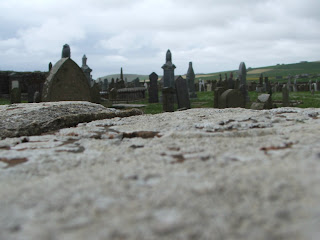
Winscombe
line 72
As when, upon a tranced summer-night, those green-rob'd senators of mighty woods, tall oaks, branch-charmed by the earnest stars, dream, and so dream all night without a stir, save from one gradual solitary gust which comes upon the silence, and dies off, as if the ebbing air had but one wave; so came these words and went; the while in tears she touch'd her fair large forehead to the ground, just where her falling hair might be outspread a soft and silken mat for Saturn's feet. One moon, with alteration slow, had shed her silver seasons four upon the night, and still these two were postured motionless, like natural sculpture in cathedral cavern; the frozen God still couchant on the earth, and the sad Goddess weeping at his feet: until at lenght old Saturn lifted up his faded eyes, and saw his kingdom gone, and all the gloom and sorrow of the place, and that fair kneeling Goddess; and then spake, as with a palsied tongue, and while his beard shook horrid with such aspen-malady: " O tender spouse of gold Hyperion, Thea, I feel thee ere I see thy face; look up, and let me see our doom in it; look up , and tell me if this feeble shape is Saturn's; tell me, if thou hear'st the voice of Saturn; tell me, if this wrinkling brow, naked and bare of its great diadem, peers like the front of Saturn. Who had power to make me desolate? whence came the strength? how was it nurtur'd to such bursting forth, while Fate seem'd strangled in my nervous grasp? But it is so; and I am smother'd up, and buried from all godlike exercise of influence benign on planets pale, of admonitions to the winds and seas, of peaceful sway above man's harvesting, and all those acts which Deity supreme doth ease its heart of love in. - I am gone away from my own bosom: I have left my stong identity, my real self, somewhere between the thone, and where I sit here on this spot of earth. Search, Thea, search, open thine eyes eterne, and sphere them round upon all space: space starr'd, and lorn of light; space region'd with life-air; and barren void; spaces of fire, and all the yawn of hell. - Search, Thea, search! and tell me, if thou seest a certain shape or shadow, making way with wings or chariot fierce to repossess a heaven he lost erewhile: it must - it must be of ripe progress - Saturn must be King. Yes, there must be a golden victory; there must be Gods thrown down, and trumpets blown of triumph, and hymns of festival upon the gold clouds metropolitan, voices of soft proclaim, and silver stir of strings in hollow shells; and there shall be beautiful things made new, for the surprise of the sky-children; I will give command: Thea! Thea! Thea! where is Saturn?"
This passion lifted him upon his feet, and made his hands to struggle in the air, his Druid locks to shake and ooze with sweat, his eyes to fever out, his voice to cease. He stood, and heard not Thea's sobbing deep; a little time, and then again he snatch'd utterance thus. - "But cannot I create? cannot I form? cannot I fashion forth another world, another universe, to overhear and crumble this to nought? where is another chaos? where?"
That word found way unto Olympus, and made quake the rebel three. - Thea was startled up, and in her bearing was a sort of hope, as thus she quick-voic'd spake, yet full of awe... Keats: work in progress.



























